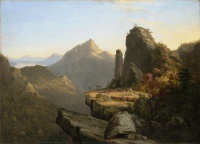James Fenimore Cooper
From The Art and Popular Culture Encyclopedia
|
"We must be a little wary when Brander Matthews tells us that Cooper's books “reveal an extraordinary fulness of invention.” As a rule, I am quite willing to accept Brander Matthews's literary judgments and applaud his lucid and graceful phrasing of them; but that particular statement needs to be taken with a few tons of salt. Bless your heart, Cooper hadn't any more invention than a horse; and I don't mean a high-class horse, either; I mean a clothes-horse. It would be very difficult to find a really clever “situation” in Cooper's books, and still more difficult to find one of any kind which he has failed to render absurd by his handling of it. Look at the episodes of “the caves”; and at the celebrated scuffle between Maqua and those others on the table-land a few days later; and at Hurry Harry's queer water-transit from the castle to the ark; and at Deerslayer's half-hour with his first corpse; and at the quarrel between Hurry Harry and Deerslayer later; and at—but choose for yourself; you can't go amiss." --"Fenimore Cooper's Literary Offenses" (1895) by Mark Twain |

|
Related e |
|
Featured: |
James Fenimore Cooper (1789 – 1851) was an American writer of historical romances of colonial and indigenous characters from the 17th to the 19th centuries. He is best known for The Last of the Mohicans (1826).
The novel that launched his career was The Spy, a tale about espionage set during the American Revolutionary War and published in 1821. He also created American sea stories. His best-known works are five historical novels of the frontier period, written between 1823 and 1841, known as the Leatherstocking Tales, which introduced the iconic American frontier scout, Natty Bumppo. Among his more famous works is the Romantic novel The Last of the Mohicans, often regarded as his masterpiece. Throughout his career, he published numerous social, political, and historical works of fiction and non-fiction with the objective of countering European prejudices and nurturing an original American art and culture.

